
A U.S. military strike on a migrant detention center in the north of Yemen has killed at least 68 people, largely migrants from African nations, bringing the death toll from U.S. attacks on the country to over 250 since mid-March. Middle East researcher Helen Lackner says the number of deaths is likely twice the officially recorded number, as the United States has now conducted more than 1,000 strikes on Yemen “on an absolutely nightly basis.” Lackner says the humanitarian crisis in Yemen has also been exacerbated by the end of U.S. aid and the U.S.'s designation of the country's Houthi movement as a “foreign terrorist organization.” “People who are living in the country are suffering on a daily basis from basically terror and fright or from being attacked and possibly being bombed and killed [at] any time.”
Transcript
AMY GOODMAN: This is Democracy Now!, democracynow.org. I’m Amy Goodman, with Nermeen Shaikh.
NERMEEN SHAIKH: The U.N. is warning ongoing U.S. attacks on Yemen pose a deadly risk to civilians, after a U.S. strike on a migrant detention center in the north of the country killed at least 68 people Monday and injured dozens more. Most or all of the victims are believed to be asylum seekers from African nations. The U.S. has killed over 250 people and carried out over 800 strikes on Yemen since March 15th, after Houthi fighters vowed to resume targeting ships in the Red Sea in an attempt to pressure Israel to end its assault and siege on Gaza.
AMY GOODMAN: We go now to Oxford, England, where we’re joined by Helen Lackner, author of several books on Yemen, including Yemen in Crisis: The Road to War and Yemen: Poverty and Conflict. She’s been involved with Yemen for over half a century, lived there for a total of more than 15 years between the 1970s and the 2010s.
Helen Lackner, thanks so much for being with us. Eight hundred strikes in these last few weeks, talk about the significance of this.
HELEN LACKNER: Well, thank you for showing some interest in what’s happening in Yemen.
Actually, by now, it’s more than 1,000 strikes. So, we’ve got much worse, and your death count is distinctly about half the actual number of people who have been killed. So, basically, you have now a situation where the U.S. has been bombing Yemen on an absolutely nightly basis since the 15th of March. I think not a single night has gone by without any bombs on the area of Yemen that’s controlled by the Houthi, supposedly, rebels. So, this is the situation that you’re dealing with. And not only, of course, have many people now been killed, but massive amounts of infrastructure has been destroyed, and people who are living in the country are suffering on a daily basis from basically terror and fright or from being attacked and possibly being bombed and killed any time.
NERMEEN SHAIKH: Well, Helen Lackner, if you could also talk about other Trump policies that have immiserated a population that is already on the brink of starvation, what Trump has done both with USAID, together with these attacks and other steps that the government has taken, the Trump administration has taken, since taking office in January?
HELEN LACKNER: Yes, the two other elements that are affecting the Yemeni population, one, the complete cut of USAID and assistance. And, for example, Yemen was the worst humanitarian crisis in the world, until it got overtaken by the disasters in Gaza and in Sudan. But it’s not that the situation has improved in Yemen. And, for example, U.S. used to finance about 62% of the — last year, of the financing for the World Food Programme, and this year it’s financed 0% of the amount available for the World Food Programme. And you have about 17 million Yemenis who are dependent on food aid in some form or shape, in addition to all the projects and other activities that were financed by USAID, which have all been stopped.
The other, the third element, which has gotten even bigger and more long-term impact, has been the declaration of the Houthi movement as foreign terrorist organizations. So, that has major impacts. In particular, it means that all commercial activities are going to be extremely difficult to operate throughout Yemen, whether they are under Houthi control or not, because there’s very little facility for differentiating. If you’re a company that’s importing food or that’s importing medical supplies or that’s importing other basic activities for Yemen, how do you prove that you’re not doing it in the Houthi area, but only in the areas that are not controlled by the Houthis? So, that’s another element. It’s also preventing the banking sector from operating. It’s also preventing the humanitarian organizations from operating. It’s also, of course, affecting the United Nations and the efforts to bring some kind of peace negotiations. So, all these factors are extremely important in the situation in Yemen at the moment, which are all affected by — basically, by the new Trump policies since January.
AMY GOODMAN: We just have 30 seconds, then we’re going to do a post-show with you, but I wanted to ask — the U.S. says they’re taking Yemen because the Houthis are attacking ships in the Red Sea. Can you explain why they’re doing this?
HELEN LACKNER: Well, number one, the Houthis have completely stopped attacking ships in the Red Sea after the Gaza — when the Gaza ceasefire started in January. And they were threatening to restart them, but they did not restart them. And the only things they’ve been attacking in the Red Sea in the last few weeks have been the U.S. military targets that have been going there. Basically, the Houthis have been doing — or, whatever they have done in that sector, and as well as launching missiles and drones towards Israel, has been with the intention of assisting the Palestinian movement.
AMY GOODMAN: Helen Lackner, we want to thank you for being with us, covered Yemen for half a century, author of Yemen in Crisis: The Road to War and Yemen: Poverty and Conflict, among many other books. I’m Amy Goodman, with Nermeen Shaikh.


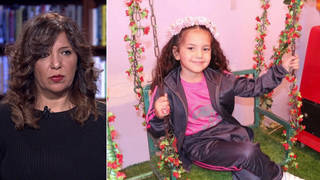


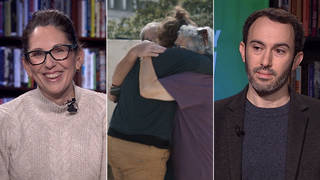

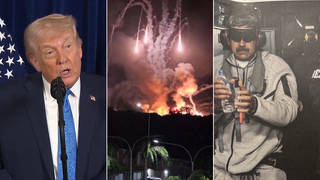
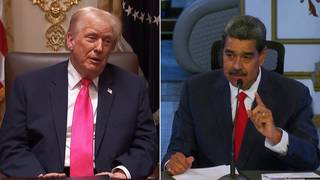

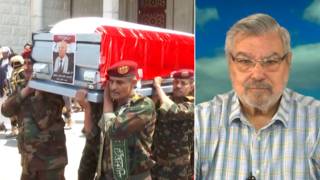

Media Options